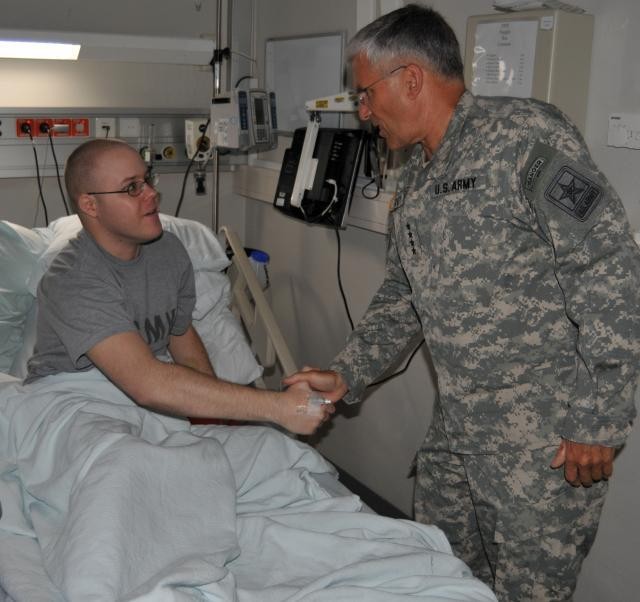LANDSTUHL REGIONAL MEDICAL CENTER, Germany (Sept. 28, 2009) -- During a visit with wounded warriors in Germany, Army Chief of Staff Gen. George W. Casey Jr. discussed challenges his Soldiers and their families have successfully faced in the last few years, and explained initiatives underway to help -- one of them scheduled to begin over the next month.
Casey said the first element of the Comprehensive Soldier Fitness program -- designed to teach Soldiers to become more resilient in five aspects of total fitness: physical, emotional, social, spiritual and family strength -- officially begins in October with an on-line assessment all Soldiers can take in the privacy of their own room.
The online instrument, called the Global Assessment Tool or GAT, is designed to provide Soldiers, civilian employees and family members with a confidential picture of their overall fitness and well-being.
But CSF doesn't begin and end there. Casey said every phase of leadership development training, from Basic Combat Training to the Army War College, will include progressive modules of CSF to help leaders understand how to build resiliency in themselves and their Soldiers.
The most critical element of CSF is set to begin about this time next year when Casey said a Master Resiliency Trainer will be placed in every battalion in the Army. MRTs are part of a $100-million collaboration with the University of Pennsylvania to provide all Soldiers the resiliency skills they need to enhance their performance.
About 100 Soldiers have already received MRT training at the university, and Casey said the several trainers he has spoken with about the program are excited about taking what they have learned from the classroom to the back battalion.
"These are Soldiers helping Soldiers," Casey said. "Every one of them has told me they see the value of the training both in their personal and professional lives."
Casey also discussed ensuring that access and treatment for the mental health needs of Soldiers continues to improve.
"We have made great strides in reducing the stigma people feel in getting assistance for mental-health fitness problems," he said. "We've reduced the stigma by about 50 percent. It has been a huge step, but we're an Army of 500,000 Soldiers, so we still have a long way to go."
During his visit at Landstuhl Regional Medical Center, Casey spent time at the bedside of Soldiers injured in battle and recovering from illnesses that occurred downrange
"When I look at those remarkable Soldiers it reminds me of the cost of war and it's something none of us can ever forget," said Casey. "I'm always uplifted by their zeal to return to their unit -- that bond and camaraderie that comes through. And to the doctors, nurses and care providers, we can't thank them enough for what they do."
LRMC, which falls under the command of Europe Regional Medical Command, is the largest American military hospital outside of the United States and is verified by the American College of Surgeons as a Level II Trauma Center, making it the only U.S. medical facility overseas to hold that distinction, and only one of three in the Department of Defense.
LRMC provides care for more than 245,000 U.S. military personnel and their families within the European Command. It is also the evacuation and treatment center for all injured U.S. servicemembers, contractors and members of 44 coalition forces serving in Afghanistan and Iraq. The hospital has treated more than 57,000 since January 2004.


Social Sharing